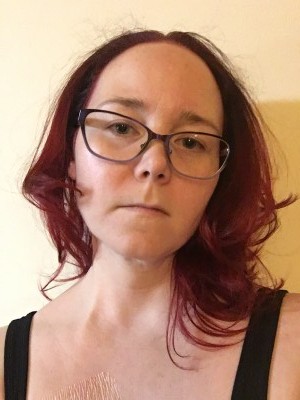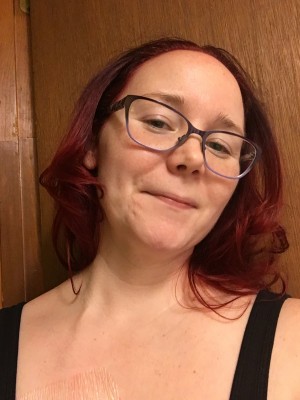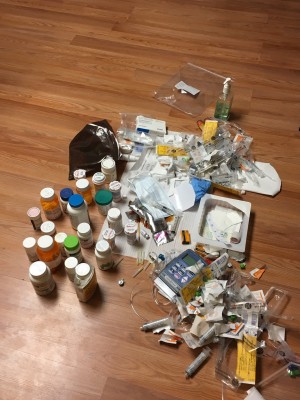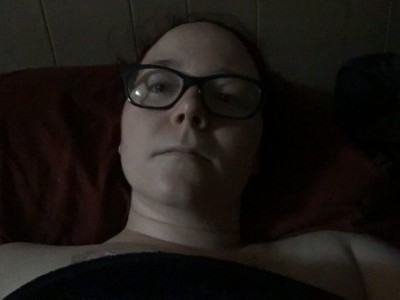I have a hard time holding it together when I’m dealing with insurance companies. I’m solid in every other aspect of my healthcare but insurance has a special taste of trauma. I get anxious before anything even goes wrong because inevitably, something goes wrong.
At the end of December, my short term disability insurance company denied my STD extension because they had assessed that I had no ongoing disabling health issues. After a lot of phone calls, emails and tears, my STD was eventually approved. In the time between my denial and my approval, I was terrified. I cannot stay alive with no insurance and no money and I certainly was not well enough to return to work.
I was notified on December 30 by phone that my STD was approved. I assumed that meant that the claim was actually approved. I will no longer make such assumptions. Because what actually happened was that I was approved on January 4 and my work was not notified until January 9. I didn’t find that out until I checked my bank account last week to discover that I had not been paid. That was also when I discovered that as far as my health insurance could tell, I did not have health insurance.
Like most people living in the US, my insurance deductible resets on January 1. I have excellent health insurance. Truly, genuinely excellent. My yearly out of pocket maximum is $3500 and I meet that within the first two weeks of January every year. So last week, when I discovered I had not been paid and clarified that it was not a clerical error, I was already expecting to pay the cash price for several of my meds as I had not yet met my deductible. A huge amount of money. Except I had not been paid and did not feel confident that I would be paid again and was told I did not have active health insurance.
So massive expenses that I would be completely unable to meet sustainably. If I sold everything I own, paid no other bills, and used every last cent I had to my name, I could have paid for about three weeks worth of routine health care (prescriptions, infusion nursing, IV meds, compounded meds, routine bloodwork, routine appointments, line supplies).
Panic does not describe what happened to me. We use the term “worst nightmare” loosely to mean anything we really don’t want to experience. In this case, I mean it literally – I literally have nightmares about losing my health insurance, or losing my medications, or not having supplies for my port. It felt like there was a snake winding around my heart, constricting and suffocating me. My hands shook. I woke up from anxiety dreams about losing my insurance and not having money to pay for medical expenses to realize that my waking life was just as scary.
I spent a lot of this week on the phone with my disability insurance, my health insurance, and the HR department at my work. My immediate terrible fear when I discovered all of this late on a Friday afternoon was that I had been fired. Fortunately, this is not what happened. (Long time readers will remember that I love my job and have been well cared for by my company – this is not lip service. They have been truly amazing at working around my complex health.) But my disability insurance didn’t tell me right away that my company wasn’t notified of my approval until January 9 so it took days to figure out why I hadn’t been paid. Meanwhile, I shelled out a ton of money for meds without knowing when I would have money coming in again.
I have dealt mostly with one person at the disability insurance throughout this process. She is the one who has repeatedly denied my claim only to later reverse that decision based upon information that had already been provided. My eyes start tearing as soon as I see her number come up on my phone and as soon as I hear her voice. I have the same conversation with her over and over. Every time, she remarks that if I say is true (it is), then how would I be able to return to work, ever? No, if I were so sick, my doctor would decide that I would never be able to return to work and thus I should not be applying for short term disability. We have the same back and forth where she tries to poke holes that don’t exist in my well documented, well described, and well proven health narrative.
I was finally paid this morning, which I did not discover until after I woke up to her calling me. We had our normal conversation in which she didn’t believe I was sick but I am anyway and we just rode that around in circles for a while. I mentioned that I am having trouble keeping food down, especially the last few days. And then, this happened:
Her: “You are just vomiting up your food all day? Well, I think that probably your doctor should recommend that you are permanently disabled.”
Me: “Why would I be permanently disabled? I do not need perfect health to return to work. I have lived with this condition most of my adult life. I can work. I just need to get back to my baseline.”
Her: “Well, I don’t know how that can be. If you’re saying that you have been throwing up all your food for three days, I don’t know how you could think that you can work. I couldn’t work if that were happening for even one day.”
Let’s review.
I vomit most days. This is not recent. I take multiple doses of three medications every day to avoid vomiting constantly and have two other meds if those don’t work. The vomiting is worse recently due to the gastroparesis but I puked a lot before that, too. I throw up at work probably 3-4 times a month. I just throw up, brush my teeth, and go back to work. Just part of my day.
This woman stated that she would be unable to work if she puked up all her food for even one day. In her mind, that is a justifiable reason to not work.
As recently as two weeks ago, this woman denied my disability claim because she did not feel I was sick enough to be unable to work. But she herself said that if she had to experience even a small portion of my daily symptoms, she would be unable to work. The hypocrisy is nauseating.
I was paid today and my insurance has been straightened out. Several times this week, this woman told me that I needed to not be so upset and that I was making things harder on myself by being upset. Spoken like a person who has never had to live in fear that losing their insurance would kill them.
It’s never real until it’s you. It never matters until it’s you.



